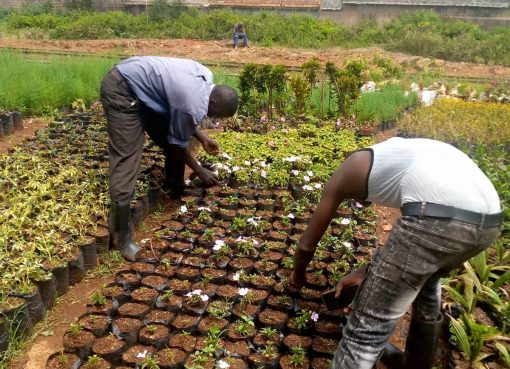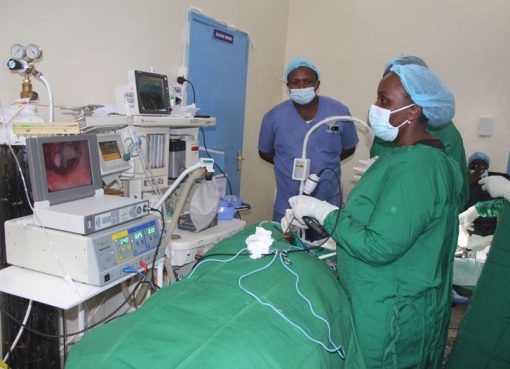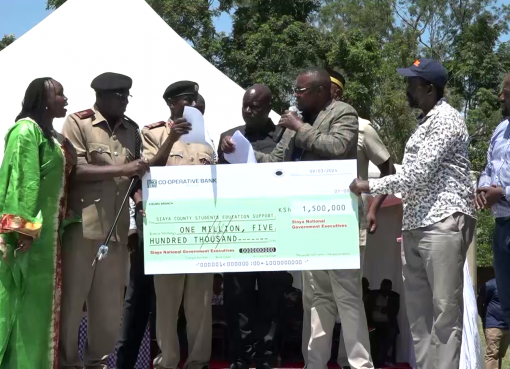The Welt Hunger Hilfe, a German non-governmental organization, is undertaking a farming project in Marsabit County aimed at making local communities food secured.
In a move seen as one complementing the government endeavor to diversify economic activities of the predominantly livestock keeping communities the organization is deliberately empowering local households to venture into crop farming.
Welt Hunger Hilfe has spent sh 2,216,650 to fund a Vegetable Gardening Program in various parts of the county where 750 women beneficiaries have been enabled to produce food at the household level.
Majority of Marsabit residents depend on imports of fresh vegetables and fruits from other parts of the country like Meru, Tharaka Nithi and Nyeri counties as well as the neighbouring Ethiopia.
Getting food requirements or supplies from outside has for a long time compromised the quality of diet and exposed communities to undernourishment and general food insecurity owing to low purchasing power.
The pastoralists main diet is meat and milk which is majorly protein and they rarely have vegetables and fruits in their intake because they are either unavailable or lack the knowledge about the importance.
In Odda sub-location of Moyale sub-county we found Ije Guyo whose vulnerability for relief food had marked the best part of her life but who now comfortably fends for her family of four through the quarter of an acre garden.
This main source of income for her household grows maize, beans, green grams, pigeon and cowpeas.

The mixed farming though in small scale at the backyard enables her to put food on the table hence saving the family from the indignity of being a perennial reliant on relief assistance.
Her sentiments were echoed by local residents who said that they were diversifying their food sources through small-scale farming by applying the skills gained from training sessions from Welt Hunger Hilfe.
An immediate neighbour to Ms Guyo, Kaltuma Ahmed told KNA that the shift to cultivation as opposed to looking after few goats which belong to their husbands was now inculcating healthy eating and sourcing for food albeit gradually.
The intervention has also seen the beneficiaries cushioned against the economic hardships fueled by the Covid-19 pandemic.
“Raising our own food has greatly helped us to maneuver the hardship brought about by this pandemic,” she said in Kiswahili adding that the empowerment had made them self-reliant.
The problem of nutrient deficits and the consequent diseases is no longer a problem while a boost for the education of local children is all time high because families no longer roam with their heads in search of pasture for livestock.
Ms Ahmed now at her 60 revealed how the German organization under its KEN-1198-20 project provided them with tools and seeds after undergoing training in organic farming, pest and disease control last year.
In these groups of poor women are 3,750 persons who are directly benefiting from the initiative while another 1,250 people from the vicinity buy fresh vegetables and other farm produce supplies from the kitchen gardeners.
The growers to be found in areas focused by the program like Dakabaricha, Sagante, Badassa, Kinisa, Walda and Sololo largely depend on water from boreholes and wells whose maintenance is through the assistance from Welt Hunger Hilfe hence building resilience to the vulnerable families.
At other times the little rains received in the arid and semi-arid county give their drought resistance and fast maturing crops a boost.
According to data collected on a weekly basis by the NGOs field officers the beneficiaries have been able to produce about 100,000 kilograms of vegetables since the activity kicked off in November last year.
The women sell their surplus produce in trading centers within the vicinity which earns them some income for home upkeep and additional seeds for sustainability.
Most of the women said they make between sh 3,000 and 4,000 monthly from mostly the sale of Sukuma wiki and spinach.
However, the initiative has had its share of challenges especially water shortage which limits the now enthusiastic women from expanding their farming activities.
The little water from the boreholes has to cater for domestic, livestock and now food crop cultivation which is not enough.
Their hope remains high that the government and its development partners would continue with efforts to avail water to all.
Marsabit Central deputy commissioner Patrick Muriira appreciated that the endeavor by the organization was in line with the government policy on food security and poverty alleviation as captured in the big four agenda and the strategic development goals.
Pointing out that that resources were never enough Mr Muriira appealed to donors to assist in making more water sources like boreholes available to the residents.
The DCC underlined the importance of public -private partnership which he said accelerates growth.
By Sebastian Miriti





